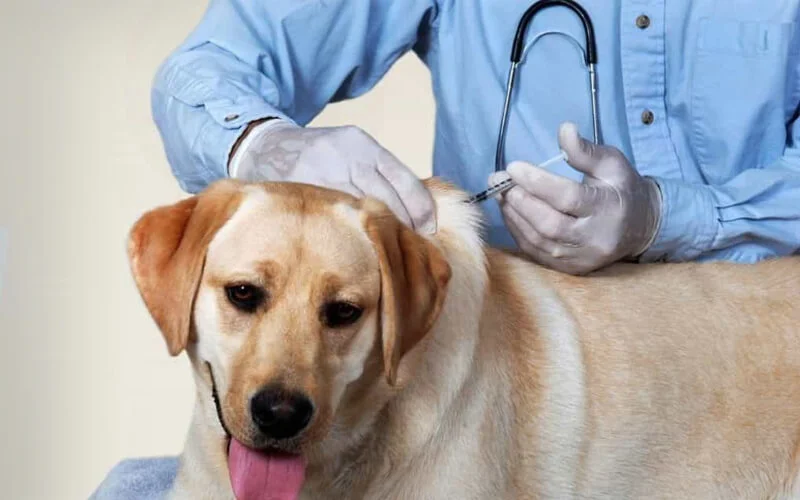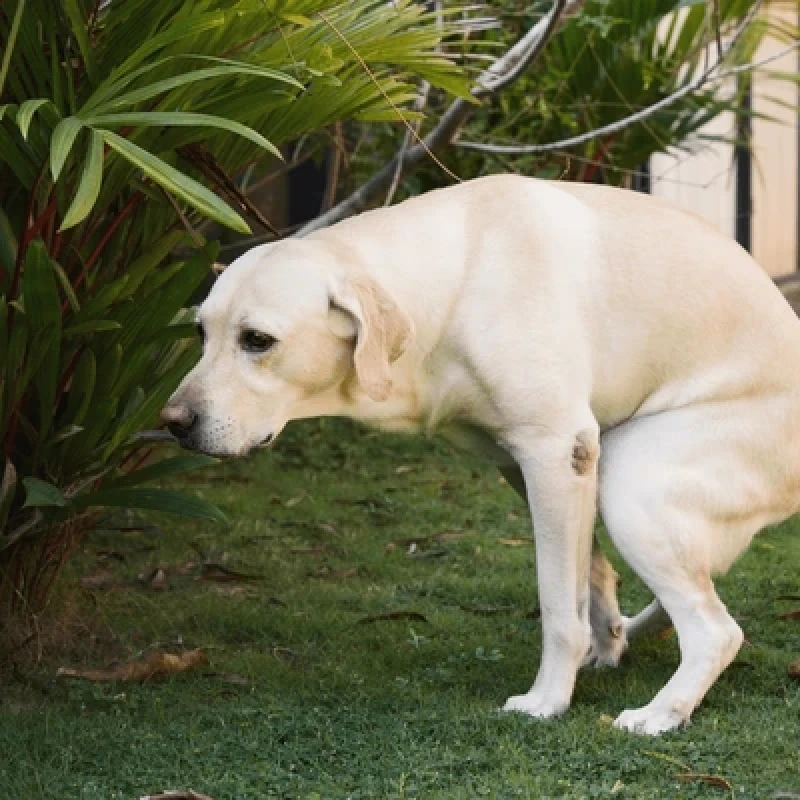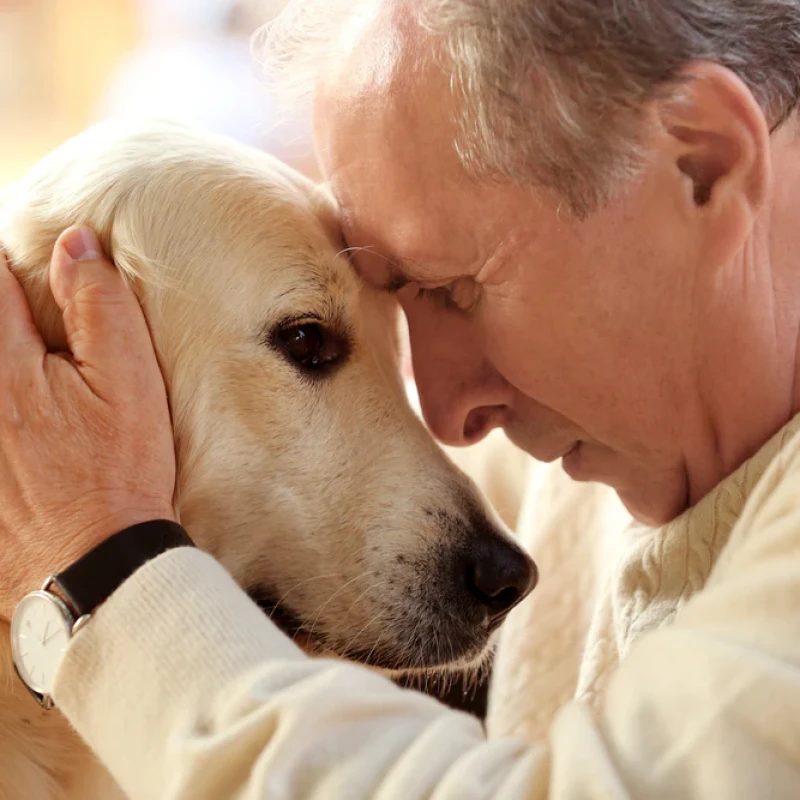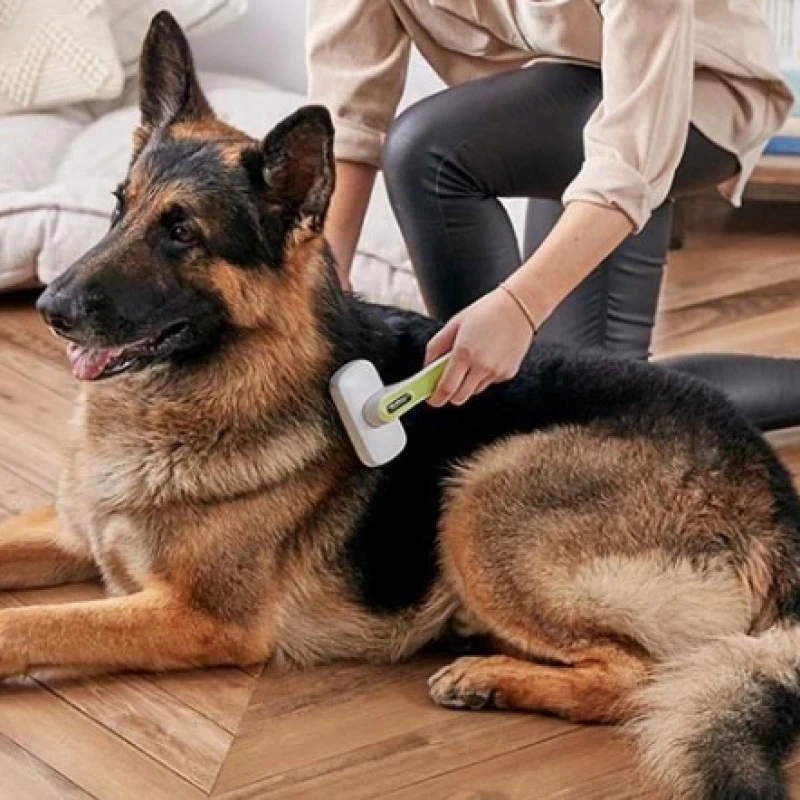As the veterinary industry continues to evolve, new vaccines are constantly being developed to combat infectious diseases, helping dogs to become more resilient. Vaccinating dogs not only helps them stay away from the risk of illness but also enhances their health and longevity. To ensure that you keep track of and fully vaccinate your dog, you should not overlook the important information that Pet Mart provides below

**What are vaccines for dogs and how do they work?**
Vaccines for dogs (vaccine) play an important role in protecting their health. But what exactly is a vaccine and how does it work?
**Concept of vaccines:** A vaccine is a biological preparation that contains microorganisms (or parts of them) that have been killed or altered. Its main goal is to stimulate the dog's immune system, helping the dog learn to recognize and respond to that microorganism. When the dog encounters this microorganism again, it will either not get sick or be affected to a lesser extent.
**How vaccines work:** When vaccinated, dogs are exposed to the inactivated pathogens. This allows the dog's immune system to "learn" and "practice" how to deal with the actual bacteria or virus. Simply put, a vaccine simulates an attack by bacteria or viruses, preparing the dog for real attacks in the future.
**Important note:** Although vaccines have the ability to protect dogs from diseases, they cannot prevent bacteria or viruses from entering the body. This means that a vaccinated dog may not get sick, but it can still pose a risk of infection to other dogs.
**Difference between live and killed vaccines:** In live vaccines, the virus or bacteria have been weakened but still stimulate the immune system. In contrast, killed vaccines contain dead viruses or bacteria. Killed vaccines often require adjuvants to stimulate a stronger immune response. The choice between the two types depends on the dog's health condition and living environment. Consulting a veterinarian is crucial for this decision.
**Why should dogs be vaccinated?**
When it comes to dog ownership, one of the most important issues that owners need to pay attention to is the health and safety of their pets. One of the best ways to ensure safety and good health for dogs is through vaccination. But why is vaccination so important?
- **Protecting dogs from infectious diseases:** Vaccines are specially designed to stimulate the dog's immune system, helping them develop the ability to resist dangerous infectious diseases. When vaccinated, dogs are equipped with "weapons" to fight off pathogens, reducing the risk of illness and minimizing the severity of disease.
- **Protecting the community:** Vaccination not only helps protect your dog but also helps protect the entire community. Infectious diseases can spread rapidly among dogs and even between dogs and humans. Vaccination helps minimize the spread of diseases and reduces the risk of outbreaks.
- **Prevention is better than cure:** Some diseases that dogs may contract have no effective treatment, and vaccination is the only way to protect dogs from the risk of illness. Moreover, vaccination costs are often much lower than the costs of treating a serious illness.
- **Saving time and money:** While there may be an initial cost for vaccination, compared to the expenses and time spent caring for a sick dog, vaccinating your dog is a more economical choice.
- **Enhancing health and longevity for dogs:** Dogs that are regularly vaccinated will have better health, longer lifespans, and are more likely to live longer than those that are not vaccinated.
**What vaccines do dogs need?**
When raising a dog, vaccination is one of the essential activities to protect the health of your pet. So, what vaccines do dogs need to prevent dangerous diseases? Read on for more details.
- **Canine Parvovirus (Parvo):** Parvovirus in dogs is a dangerous disease caused by a virus. This disease is highly contagious for puppies and has a high mortality rate. Parvo spreads mainly through direct contact with the saliva or feces of infected dogs. Common symptoms include vomiting, bloody diarrhea, and dehydration. Even with supportive treatment, many dogs still do not survive parvo. It is crucial to vaccinate early to prevent this disease.
- **Infectious hepatitis:** This disease affects major organs such as the liver, kidneys, eyes, and lungs. It spreads mainly through contact with saliva and other body fluids from infected dogs. Signs of the disease can vary, from mild symptoms such as fever and loss of appetite to severe manifestations like conjunctivitis, vomiting, and sometimes death. Treatment depends on the severity and overall health of the dog.
- **Kennel cough (canine flu and tracheobronchitis):** Kennel cough is a respiratory infection. This disease is highly contagious and spreads quickly in environments with many dogs. The main signs are severe coughing, as if the dog is gagging or trying to cough something up. Tracheobronchitis may resolve on its own, but some cases require medication. Vaccination is the best way to prevent this disease.
- **Leptospirosis (Lepto):** Lepto in dogs is a bacterial disease, not viral. This disease is easily transmitted through contact with infected urine or contaminated water. Common symptoms include fever, diarrhea, loss of appetite, and jaundice. Lepto can also be harmful to humans, so vaccinating dogs not only protects them but also protects us.
- **Canine coronavirus:** Coronavirus in dogs (CCV) is a virus that specifically causes illness in dogs. CCV infections are usually not severe but can become dangerous if they occur simultaneously with other virus infections such as Parvovirus. Symptoms include diarrhea, fever, and vomiting. A special vaccine for dogs can help prevent this disease.
- **Rabies:** Rabies in dogs is an infectious disease caused by a virus that can be transmitted to humans and is fatal. The disease is primarily transmitted through the saliva of infected dogs via open wounds. Common symptoms in dogs include abnormal neurological signs and rigid jaw. Once a dog has rabies, vaccination and treatment are no longer viable.
**When is the vaccination schedule for dogs?**
Vaccinating dogs is an important measure to protect the health of our beloved pets from infectious diseases. Below is a detailed guide on the vaccination schedule for dogs, helping you better understand the importance of this.
**Why should dogs be vaccinated on time?** Vaccinating on schedule helps strengthen the immune system of dogs, enabling them to prevent dangerous and infectious diseases. Although different dog breeds may vary in size, the vaccination schedule is generally similar.
**Vaccination for puppies:**
For puppies born at home, vaccines should be administered 30 days after birth, followed by a combination vaccine at 7-8 weeks of age, and continue according to the above schedule. For puppies bought from other places, if they have received 2 doses, a third dose should be given.
- **First dose (6 – 8 weeks):** Given after weaning. It includes the 5-in-1 vaccine: Canine Parvovirus, Canine Distemper, Infectious Hepatitis, Kennel Cough, and Canine Influenza. You can combine deworming and vaccination for puppies in this first dose.
- **Second dose (10 – 12 weeks):** Should not be given earlier than 3 weeks or later than 4 weeks after the first dose. It includes the 7-in-1 vaccine: the 5 diseases mentioned above plus Lepto and Corona.
- **Third dose (14 – 16 weeks):** Should not be given earlier than 3 weeks or later than 4 weeks after the second dose. It includes the same 7-in-1 vaccine as the second dose.
- **Rabies vaccination (13 months):** Rabies vaccinations for dogs should be given once every year.
**Important note:** Dogs need to receive a booster for the 7-in-1 vaccine every year, preferably following a schedule for easier memory. Puppies need to receive their first dose before 16 weeks of age and complete the 3 doses before they are 1 year old. After vaccination, you should observe the dog for about 30 minutes to ensure no adverse events occur. Dogs should not be vaccinated when they are ill or have health issues.
Vaccination for Adult Dogs
Although adult dogs have a stronger immune system compared to puppies, regular booster vaccinations help keep their immune system in optimal condition to combat infectious diseases. For adult dogs, whether newly adopted or long-time pets, it’s important to receive booster vaccinations and rabies shots annually.
Depending on their living environment and health conditions, dogs should be checked and dewormed 1 to 4 times a year. Worms can cause various health issues in dogs if not controlled. Before proceeding with any vaccination schedule, you should consult a veterinarian to ensure that the vaccination plan is appropriate.
Benefits and Importance of Keeping a Vaccination Record for Dogs
When deciding to care for a dog, monitoring their health through a vaccination record or health log is extremely important. Here are the benefits of having this record:
- Accurate Health Monitoring: The vaccination record helps track the dog’s health, including vaccination history and medical conditions, enabling the veterinarian to diagnose health issues accurately.
- Convenience for Caregivers: Breeders or dog owners can refer to the vaccination record to know the dog's age, breed, and health history, making breeding and sales more transparent and trustworthy.
- Assistance in Transportation and Ownership Changes: When dogs need to be transported internationally or change owners, the health record serves as reliable proof to facilitate this process.
- Preventing Loss: If a dog goes missing, having the record can help locate the lost dog more easily and reclaim them from dog-catching teams or animal shelters.
Where to Obtain a Dog Vaccination Record: Typically, you don’t need to purchase a health log. When you buy vaccines or take your pet to the vet for vaccinations, the veterinary company usually provides this record for free. For those without a regular veterinarian or who self-vaccinate at home, keeping a written record is also a good option.
Ensure the vaccination record is accurately and fully updated. All entries and confirmations from the veterinarian need to be clearly documented. Important contents in the health record include:
- Owner Information: Name, address, phone number, etc.
- Dog Information: Name, color, breed, sex, ear number, or Microchip.
- Veterinarian Information: Name, phone number, clinic address.
- Health History: Vaccination history, treatments, surgeries, breeding information, etc.
Situations Where Vaccination Should Not Be Administered to Dogs
Vaccination is an essential part of dog care. However, in certain specific cases, vaccination may not be appropriate and could even harm the dog. Here are some considerations before vaccinating your dog:
- Pregnant Dogs and Nursing Puppies: Pregnant dogs or nursing puppies should not be vaccinated. Vaccination in these cases may lead to complications for both the mother and the puppies.
- Mother Dogs Postpartum: Mother dogs should not be vaccinated for at least half a month after giving birth to avoid complications.
- Sick Dogs: If your dog is ill, vaccination may worsen their health condition. Dogs with chronic diseases such as skin parasites, mites, scabies, or heavy worm infestations should be dewormed before vaccination.
- Recently Mated or In Heat Dogs: New dogs should not be vaccinated immediately; wait 7-10 days after ensuring they are healthy before vaccination.
To ensure that vaccinations are carried out safely and effectively, follow these recommendations and always consult with a veterinarian beforehand. Here are some things to keep in mind:
- Health Status of the Dog: First, ensure that your dog is in good health. This means not vaccinating when they are sick or infested with parasites. If your dog has health issues, consult a veterinarian and take necessary measures before proceeding with vaccination.
- Vaccination Schedule: Only a veterinarian can establish an appropriate vaccination schedule for dogs. Therefore, you should carry out vaccinations at reputable and quality medical facilities.
- Post-Vaccination Monitoring: After vaccination, observe your dog for about 30 minutes to ensure they don’t experience any problems.
- Post-Vaccination Care: What should you avoid after vaccinating your dog? Avoid bathing your dog for about a week post-vaccination. Additionally, enhance their nutrition and avoid giving them fatty foods, dairy, or fishy items.
Incidents to Note Before Vaccinating Dogs
Vaccination is an important part of dog care. However, vaccination does not always yield the expected results. Certain incidents can occur after vaccination, and we need to know how to handle them. After vaccination, it is advisable to keep the dog in a quiet place and observe them for at least 30 minutes to ensure there are no allergic reactions.
Common Reactions After Vaccination
Common reactions include: severe itching, rashes, facial swelling, watery eyes, and nasal discharge. Dogs may bite at their toes or legs, scratch, and rub excessively. Symptoms can include rapid breathing, wheezing, or sneezing, as well as diarrhea and vomiting. The dog may initially show signs of anxiety, cloudy eyes, a cold nose, and later experience a rapid heartbeat, difficulty breathing, and unsteady legs. If no abnormalities are present, they may return to normal after about an hour. If the dog experiences a strong allergic reaction, veterinarians can intervene promptly.
Mild Reactions: After vaccination, dogs may feel tired, have a mild fever, and lose their appetite for 1-2 days. These are temporary reactions and do not pose a health risk.
Moderate Reactions: Some dogs may experience mild diarrhea, hives, rashes, or even vomiting. These symptoms usually resolve on their own after a while. Applying an ointment containing Corticosteroids for a few days can help.
More Serious Incidents
Allergic Reactions: Administering 1ml of Chlorpheniramine subcutaneously or 10% Gluconate intravenously may help. Approximately 20 minutes after treatment, the dog may return to normal. If not, Chlorpheniramine can be given again until symptoms subside.
Anaphylactic Shock: This is a severe allergic reaction occurring after vaccination, characterized by rapid heartbeat, difficulty breathing, and, in severe cases, coma.
Neurological Issues: These can arise 9-12 days after vaccination, presenting as mild fever, discharge, and potentially leading to seizures in dogs. During examination and testing, conditions like encephalomyelitis and increased white blood cells may be observed. If recovery occurs, there may be long-term mobility impairments. The animal is at a high risk of death.
Reasons Why Vaccines May Be Ineffective
Did you know that many vaccinated dogs can still contract diseases? So what are the reasons, and how can you ensure effective vaccination for your pet? Before vaccination, take your dog to the veterinarian for a health check and pay attention to the following issues:
Vaccine Quality or Improper Storage: Vaccines must be approved and licensed by the Veterinary Department. Storage and usage must comply with strict guidelines. Vaccines are effective only if properly stored, and the dog’s environment is kept clean. Vaccines have a specific effective period, and expired ones cannot be used. Vaccines should not be moved from the cold storage to a refrigerator for an extended period, and precautions should be taken to avoid exposing them to high temperatures, which can reduce their efficacy. Improper storage and transportation can lead to decreased vaccine effectiveness and insufficient antibody production.
Vaccination Technique and Conditions: Vaccinating dogs is not just about administering a shot. Attention must be paid to dosage and the technique used by the person administering the vaccine.
Incorrect Timing of Vaccination: After vaccination, the body does not produce antibodies immediately. Dogs need several days to weeks to generate effective antibodies. If vaccination intervals are too short, interactions between vaccines can occur; if too long, effectiveness diminishes.
Choosing the Wrong Vaccine for the Disease: Not all vaccines protect against every disease. Therefore, selecting the appropriate vaccine for the disease being prevented is crucial.
Natural Immunity and the Role of Antibodies: Antibodies from the mother’s milk help puppies avoid disease in their early days. However, these antibodies only last for a limited time. For Parvovirus, puppies under 6 weeks have only a 25% efficacy when vaccinated, increasing to 40% at 9 weeks, 60% at 16 weeks, and 95% at 18 weeks.
Immune System Suppression or Existing Illness: If a dog is infected with a virus, the immune response to the vaccine may be compromised. Thus, vaccinations should always be administered when the dog is healthy.
Vaccinating Concurrently with Antibiotic Treatment: This can reduce the vaccine’s effectiveness, especially for bacterial vaccines.
Improper Mixing or Dilution: When preparing the vaccine solution, proper mixing is essential.
Insufficient Dosage: Some vaccine may spill out during administration, or a single dose may be split between two small dogs when each vaccine dose is meant for one dog.
Improper Subcutaneous Injection: This can cause bleeding and create infection or abscesses.
Using Non-Sterile Syringes or Needles: This can lead to contamination or the introduction of other substances that could precipitate or infect. Non-sterile syringes, needles, and droppers can significantly reduce the efficacy of the vaccine. Some vaccine lots may not be sterile or could be diluted with impure water, or using chlorinated water to dilute the vaccine can reduce immune activity, leading to failure.
Syringes with Excessive Capacity: If the vaccine preparation is only 1ml, using a 3-5ml syringe can leave insufficient amounts of the vaccine administered to the dog.
Using Disinfectants at the Injection Site: This can reduce vaccine effectiveness, especially for bacterial vaccines.
Poor Quality Vaccines or Diluted Vaccine Solutions: (like distilled water and saline) can also affect immunogenicity.
When it comes to vaccinating dogs, choosing the right vaccine is one of the most critical factors in ensuring your pet's health. There are many vaccine manufacturers in the market, each with its own strengths and characteristics. For detailed pricing information on 5-in-1 and 7-in-1 vaccines for dogs, refer here. Below is an overview of leading vaccine brands and their products:
NOVIBAC Dhppi Vaccine (7-in-1): Specifically designed to protect dogs against a range of infectious diseases by administering a small amount of weakened bacteria or virus, thereby stimulating the dog’s immune system to develop antibodies and respond quickly to pathogens in the environment.
ZOETIS Vanguard Plus 5/CV-L Vaccine (7-in-1): A comprehensive vaccine that helps prevent up to 7 dangerous diseases in dogs, including Canine Parvovirus, kennel cough, and various other inflammatory diseases.
ZOETIS Vanguard Plus 5 Vaccine (5-in-1): An optimal choice for preventing the 5 most common diseases in dogs, including Canine Parvovirus, kennel cough, and enteritis caused by Parvovirus.
MERIAL Recombitek C6/CV Vaccine (7-in-1): Commonly used in veterinary clinics to prevent 7 infectious diseases.
MERIAL Recombitek C4 Vaccine (5-in-1): Excellent choices that help dogs resist various infectious diseases.
VIRBAC Canigen DHA2PPi/L Vaccine (6-in-1): A unique combination vaccine that helps prevent 6 diseases in dogs. Its safety and efficacy have been validated through extensive research.
HIPRADOG 7 Vaccine (7-in-1): This vaccine helps prevent a range of dangerous infectious diseases in dogs, including enteritis, Canine Parvovirus, and diseases caused by spirochetes.
Each of these vaccines is designed to protect against one or more infectious diseases, ensuring comprehensive protection for your dog. Current vaccination service prices at veterinary clinics are:
5-in-1 Dog Vaccine: Starting from 120,000₫ – This basic vaccination helps protect your dog against 5 common dangerous diseases. For dogs living in environments with limited exposure to external surroundings and other dogs, this vaccine typically meets their needs.
7-in-1 Dog Vaccine: Starting from 150,000₫ – This vaccination expands protection for your dog, including more severe and unpredictable diseases. It is recommended for dogs that frequently travel or interact with many other dogs.
However, note that vaccination prices may vary depending on geographic location, healthcare facilities, and timing. To ensure you receive accurate and updated information, directly contact veterinary clinics or vaccination centers near you. This not only helps you catch the right price but also gives you a better understanding of the accompanying services and the quality of service each facility provides.








